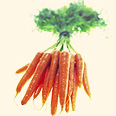CONCORD, New Hampshire - It's not often that maps make compelling cookbook copy.
But I confess to being drawn to the ones populating the pages of Gil Marks' comprehensive "Olive Trees and Honey" (Wiley, USD 29.95), a weighty collection of vegetarian Jewish recipes gathered from around the globe.
Marks, a rabbi and Jewish foods historian, accomplishes what few cookbook authors manage: an appealing blend of recipes and history that gives its stunning variety of dishes a context without tedious lectures.
Take the maps. No dense text here; just a nifty graphic that illustrates everything from the origination of stuffed cabbage in what now is Iran and its spread across Eastern Europe and the Mediterranean, to the prevalence of puff pastry and phyllo.
OK, maybe that won't thrill everyone, but foodies love that sort of trivia.
I'll confess to not being excited by "Olive Trees and Honey" when it first landed on my desk. Another Jewish cookbook? Seems every publisher suddenly has decided it is time to seize the bagel.
And I generally am unimpressed by efforts to blend history and food. Too often one or the other feels like an afterthought.
Broad range
But as I began flipping through Marks' book, I increasingly was drawn into its brief and unobtrusive history lessons, which give the recipes personality and a historical presence. As it should in a cookbook, the food remains the star.
Even reading the recipe titles is enough to get a lesson in the breadth of Jewish food. Marks draws on dishes from a broad range of locales - from Austria to Ethiopia and India to Greece - providing a rich diversity of recipes.
Marks makes a fascinating read out of the influence Jews have had on the world's culinary landscape. Who knew pickled okra, marinated artichoke hearts, and even many Indian curry dishes have Jewish roots?
Because the book's roughly 300 recipes are all traditional preparations, none "feels" vegetarian. Imagine that, a vegetarian cookbook that has no tofu.
The man deserves a medal.
Moroccan Mashed Potato Casserole
2 pound unpeeled baking (russet) potatoes
2 teaspoons table salt or 4 teaspoons kosher salt
3 tablespoons vegetable oil
3 onions, chopped
1 to 2 cloves garlic, mashed
6 large eggs
1/2 teaspoon freshly ground black or white pepper
1/4 teaspoon ground turmeric
1 carrot, diced and steamed until tender
1 cup green peas or 4 scallions, sliced
1/3 cup chopped fresh parsley or cilantro
Preparation and cooking time: 1 1/2 hours.
Preheat oven to 350 degrees.
Put the potatoes in a large pot and add enough cold water to cover by 1 inch. Add half the salt and bring to a boil. Reduce heat to medium-low and simmer, uncovered, until tender, about 25 minutes. Drain and cool the potatoes, then peel and return to the pot. Mash well, but don't overmix.
In a large skillet, heat the oil over a medium flame. Add the onions and saute until lightly golden, about 15 minutes. Add the garlic and saute an additional minute. Set aside.
One at a time, beat the eggs into the potatoes. Add the remaining salt, pepper and turmeric. Stir in the onions, carrot, peas and parsley. Generously oil a shallow 8-cup baking dish, such as an 8-inch square dish. Place the dish in the oven and heat until hot, about 3 minutes.
Spoon the potato mixture into the dish and bake until golden and set, about 50 minutes. Serve warm.
Makes 6 to 8 servings.
- Source: Gil Marks' "Olive Trees and Honey"

Carrots add color to Moroccan mashed potato recipe
Photo: CD Bank
מומלצים















